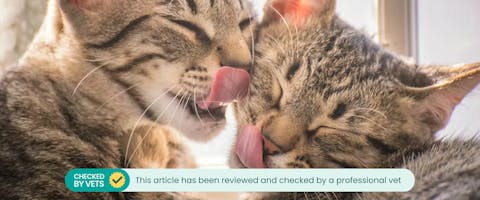Updated 20/12/24
If you’re wondering “Why do my cats groom each other?”, then you’re not alone! This behavior, called allogrooming, is about more than just staying clean. So, let’s explore the social and physical benefits as we answer the question “Why do cats groom each other?”.
Key takeaways
- Mutual grooming can reveal a lot about the bond between your furry felines.
- Curious about why cats groom each other? Read on to discover how this behavior benefits them, beyond keeping them clean.
Trending posts
Purr-use some of the top blogs our members have been loving this month- Top male dog names for your new furry friendGot a new furry family member in your pack? Check…

- Top female dog names for your new fluffy palWelcoming a new pooch into your family? Explore…

- 250+ gray cat names your silver feline will loveRecently welcomed a fluffy gray bundle of joy into…

- What are normal pet sitting rates?Discover the average pet sitting rates for animals…

- Unique dog names to stand out from the packDare to be different with our list of the best…

Why do cats groom each other?
Socializing and bonding
Cats grooming each other is often a way to build and reinforce social bonds, demonstrating trust and respect. Known as allogrooming or social grooming, this behavior is common among furry friends who are close – think family members, or purr pals who see each other as family. Cats who groom each other in front of you may want to demonstrate to you that they’re a team.
Helping each other keep clean
Cats are expert self-groomers, but even they can’t reach every spot. So, why do cats lick each other? Well, have you ever tried to lick the back of your head? Exactly. When you see cats licking each other, it’s a practical way to clean tricky areas and remove dirt and stray hairs.
Motherly instincts
Mother cats groom their kittens from birth to keep them clean, safe, and comforted. Grooming helps strengthen the bond between fur moms and their kittens and teaches them how to keep themselves clean. Many mother cats carry this behavior into adulthood, instinctively grooming other cats in a nurturing way.
Demonstrating dominance
Our purr pals also use grooming to communicate social order. “Higher ranking cats” might initiate grooming to establish their role, showing dominance over another cat. If both cats take turns grooming, it likely means they see themselves as equals. But if one cat does most of the licking, it may be their way of reinforcing the pecking order.
Relieving stress
Aside from survival and social cues, grooming is also incredibly calming. For our furry friends, the repetitive motion of licking can be soothing for both the groomer and the one being groomed.
Cats get stressed out for all sorts of reasons, especially with changes in their environment. So, think about getting a cat sitter next time you go away to ensure minimal disruption to your purr pal’s life. With TrustedHousesitters, you’ll find thousands of caring, in-home sitters who offer dedicated pet care in exchange for a place to stay and the chance to meet with furry friends. Find out why getting an in-home pet sitter is the right choice for you and your furry family by following the link below.
Considerations for pet sitters
Are you a cat sitter wondering “Why do cats clean each other?”? Maybe the kitties you’re taking care of are constantly licking each other, and you’re curious to know if it’s normal or not. Well, here are a few things to keep in mind:
- Look for changes in grooming habits. If purr pals who typically groom each other suddenly stop or if grooming turns into rough play or aggression, it could signal stress, a health issue, or even tension between them. Mention any unusual changes in behavior to the pet parents.
- Understand when grooming is comfort-seeking. Our furry felines often groom each other as a way to relax or comfort one another. If you notice an increase in grooming after a loud noise or other potentially stressful event, it may be the cats’ way of calming each other down.
- Monitor for over-grooming. Occasionally, a cat may start grooming the other too frequently or intensely, which could lead to bald spots or irritation. Over-grooming may indicate anxiety, boredom, or a health issue. Share this observation with the pet parents if it occurs as they will need to seek veterinary help to prevent the overgrooming from causing sore areas or skin infections.
Meet our veterinary expert, Corinne
This article has been checked by veterinarian Corinne Wigfall BVMBVS(Hons) BVMedSci(Hons). Corinne is originally from Wales and moved to New Zealand after graduating university. She started her career with a university based equine internship and moved onto mixed and small animal practice. Currently she splits her time between online tele triage and working in an after hours vet clinic.

